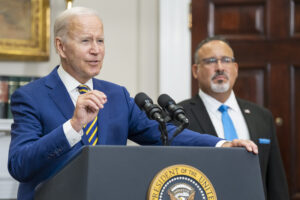
The Supreme Court’s decision to strike down President Biden’s plan to forgive up to $20,000 in student debt reveals a court marked by brazenness, stripping other branches of government of authority and reflecting a radicalized conservative shift that undermines American democracy. This decision not only carries far-reaching consequences for the financial well-being of approximately 40 million Americans burdened with college loans, but also highlights the well-documented rightward shift within the Court’s composition and ideology.
Biden’s policy seeks to provide relief to borrowers based on income thresholds. Those making less than $125,000 per year, or $250,000 for households, would qualify for $10,000 in student loan forgiveness. Pell-Grant recipients will qualify for $20,000. However, for over two months, implementation of the debt relief has been paused as a result of two lawsuits brought against the administration.
In Biden v. Nebraska, a case filed by GOP-led states, the state of Missouri argues that debt cancellation would result in financial losses for MOHELA, the Missouri Higher Education Loan Authority, and hinder their ability to repay money for a fund supporting in-state schools. However, an analysis from the Roosevelt Institute and the Debt Collective shows that this claim is fundamentally false and MOHELA’s revenue will surpass previous records as it would service more than twice the number of accounts compared to pre-COVID numbers, resulting in nearly double the revenue. Moreover, internal documents reveal that MOHELA executives were unaware of the lawsuit until the day it was filed, indicating that the organization was an unwilling party used by conservatives to nullify student debt relief. This investigation undermines the plaintiff’s case, which was already widely regarded as ludicrous, if not utterly baseless.
Despite the Supreme Court effectively killing Biden’s policy, there are other ways the Biden administration can and should implement debt relief. The law Biden is basing his debt forgiveness plan on is the 2003 Higher Education Relief Opportunities for Students (HEROES) Act, which necessitates the presence of an emergency or crisis situation, such as the COVID-19 pandemic. In contrast, the Higher Education Act grants the U.S. Department of Education unrestricted authority to enforce, pay, compromise, waive, or release any right, title, claim, lien, or demand related to federal student loans.
Beyond the specific issue of student loan forgiveness, this case highlights the Supreme Court’s anti-democratic practices and unchecked power. The Supreme Court has enshrined minority rule and served as a regressive force in American politics throughout its existence. There have been very few areas of the law where the court has proactively expanded or protected rights. Fourteen out of the last 18 Supreme Court justices have been appointed by Republican presidents, dating back to Nixon’s presidency. The undemocratic nature of the Court is evident in its composition, determined by presidents who didn’t win the popular vote and confirmed by a malapportioned Senate favoring rural white states.
The recent court is characterized by its disregard for precedent, eagerness to overthrow democratic majority preferences and adherence to self-invented doctrines. This reflects a turn towards judicial supremacy, where judges have the final say on constitutional interpretation. In the student loan case, the judicial branch subverted the will of the executive and legislative branches.
Biden’s remarks, stating “I’m fully confident that this policy is 100% legal” and “I’m not confident that the Supreme Court will uphold it,” underscore the court’s unidirectional actions and emphasize the pressing need for court reform and curtailing the court’s excessive authority. Biden should repudiate their decision and issue a strong countervailing constitutional vision to challenge the notion of the court as the ultimate expositor of the Constitution. The court hasn’t always been in diametric opposition to public opinion. Popular conviction should play a larger role in constitutional interpretation because the Constitution is meaningless if not bound to the beliefs of the American people.







